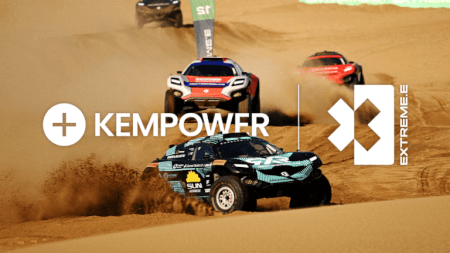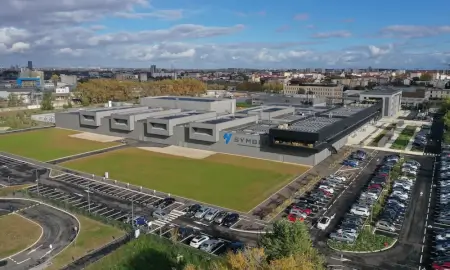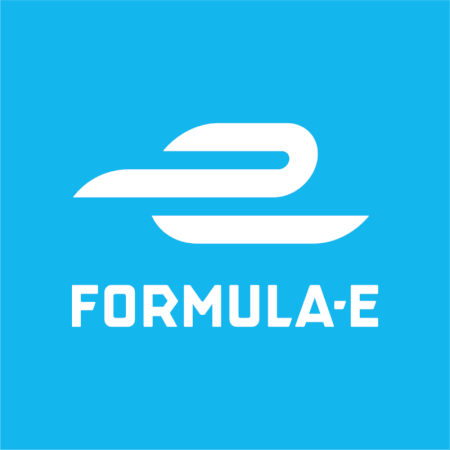October 3rd 2023
Extreme E's plans to swap electricity for hydrogen
Extreme E is still a fresh addition to the world of motorsport, but with its stock still on the rise, it’s about to press the reset button.
Last month Extreme E announced that it had signed a non-binding Memorandum of Understanding with the FIA to develop the first hydrogen-powered motorsport series, under which it could become an official FIA world championship by 2026. With the countdown clock ticking down to the debut of the provisionally titled Extreme H, series founder and CEO Alejandro Agag and its managing director Ali Russell have shed more light on the development of the category.
Agag says he expects Extreme E in its current form to go away when the hydrogen-powered cars arrive, with the idea behind the switch being to create a testbed for future technologies.
“At the end of the day what’s important for me is the relevance from the technology point of view,” says Agag, who points out that battery technology development, which will fall by the wayside when Extreme H arrives, is already happening in Formula E.
“I think that hydrogen has so many open questions, so many challenges that are opportunities, that I think we can get a lot more use out of the championship as a technology platform if we focus completely on hydrogen,” he says, “pending a final discussion with the teams.”
In making Extreme H a testbed for technology first and foremost, it would effectively make motorsport’s most modern series mirror the sport’s past days.
“Because the technology that has to come now, the ones that don’t emit carbon, aren’t developed yet, motorsport recovers its old role as a testbed for those technologies,” Agag notes. “Now we’re working deep with the hydrogen thing, nothing is there. So much is not there that we’re having to develop ourselves.
“That’s the real challenge, that’s where I see the real value.”
It’s a massive undertaking. There hasn’t been a hydrogen-only series before so there’s no benchmark, but as Russell points out, it’s a similar starting point that Formula E — also founded by Agag — faced, and the electric open-wheel series is now heading into its 10th season.
“I can remember the very start of Formula E, pitching an electric motorsport series, and people were laughing at us — who’s gonna watch a motorsport that has no sound or a lack of noise,” Russell recalls. “He [Agag] absolutely nailed that — Formula E has been incredibly successful. It’s the race-to-road message that we’ve delivered.”
In the decade since it began, Formula E has helped accelerate battery technology for EVs, evidenced by the fact that in the category’s inaugural season, drivers needed two cars to complete a race — now they can do it in one and fast charging is around the corner, too.
“That for me is exactly why we’re going into hydrogen,” Russell explains. “There’s some challenges around hydrogen at this moment in time, and it’s not that we’re we’re turning our back on our E-mobility because essentially the route that we’ve chosen to go down as a fuel cell route, it’s still driving, propelling an electric vehicle, we’re just looking at how can we do that, and break down some of the barriers that consumers have.”
The only hydrogen-only motorsport series could be an attractive prospect for automakers wanting to develop the technology, and Russell says that when the time eventually comes, Extreme H’s FIA backing will help it become an attractive place for manufacturers to come and play.
“We’ve always talked about having impact as a series and having impact is engaging with OEMs and ensuring that OEMs have a testbed for technology,” he says. “What we don’t want to be doing is testing the suspension or the brake systems. We want to be focusing on the hydrogen fuel cell, and the electric motor and batteries.”
That being said, right now Extreme E has two OEMs — General Motors and Cupra — and neither of them have made substantial moves in the hydrogen arena when it comes to their customer products. Agag admits that losing both is a real possibility.
“I pretty much think that if we go only hydrogen, we would then probably lose both. It’s a fact,” he concedes. But, he adds, “Facts don’t worry me because they happen. It’s a choice.”
“The thing is, for the first season the car is going to be one make, so there’s not going to be an opportunity to open the technology. So then attracting manufacturers is tricky, because you can attract one and put that brand all across, or you can open the technology but then it makes it so expensive that small teams don’t survive.
“We have a little bit of time because the first race of hydrogen will be February 2025, so we have time to slowly figure out the best way to have manufacturers onboard.”
Even for automakers that have yet to express a strong interest in hydrogen technology, Extreme H presents an interesting proposition, with the young technology still a curiosity for many.
“I think even the ones that have decided that hydrogen is not for them still are interested in what’s going on. No one’s 100% sure where the markets are going,” Russell says. “I don’t think this is a silver bullet — I don’t think hydrogen is the only opportunity, I think it’s part of a portfolio of opportunities there. That’s what we want to stand for, and there are more manufacturers that are looking at how they can use racing to innovate and develop.
“I think we’ve seen with Formula E the value of being first to market, and I think we really want to be first to market on hydrogen development. What makes this so interesting for us is that speed of change. I think anyone else would take probably three years to respond to this.
“This isn’t something that Alejandro just dreamt up, this is something that’s very considered and calculated, and something that we have discussed for many years now.”
Ahead of Extreme H’s 2025 debut, the first prototype turned a wheel for the first time in July. Agag describes the test as a “thing at 40 kilometers per hour — it was more of a shakedown,” but says that “it went well.”
“All the parts were in it — the fuel cell was producing the electricity from the hydrogen, it was going to the electric motors, it did what it had to do,” he reveals. “In November we need to go to 100kph, and I’m pretty sure we will do it.”
All the right moves have been made so far, and with the track record of Formula E and Extreme E, there’s enough evidence that the rebirth will be another success, but Agag is under no illusions about the task at hand.
“I think there is risk, but the interesting thing is to be the only one,” he says. “We can be a niche.
“We are going to be the only pure hydrogen championship for many years, I think, so that gives us a unique position. If we become marginalized and we suffer for that or we disappear, it’s OK. We’re not here to do the easy thing. We’re going to give it a big try.”













